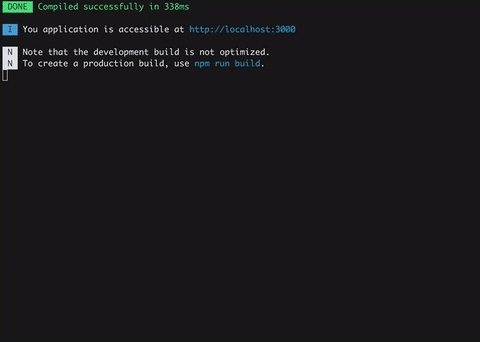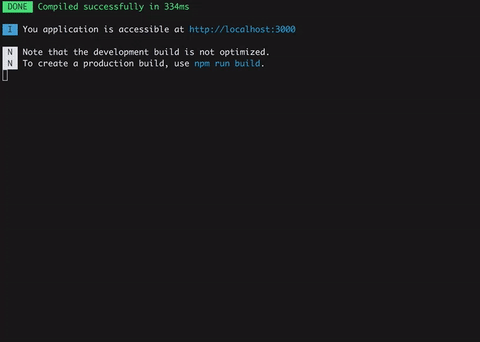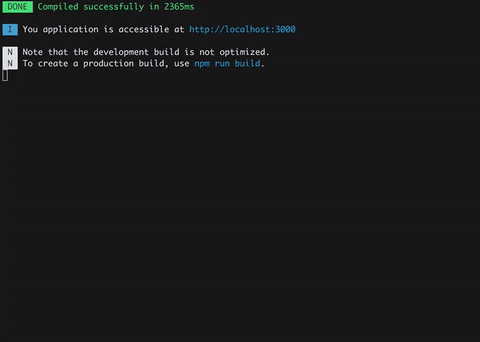
Security News
JSR Working Group Kicks Off with Ambitious Roadmap and Plans for Open Governance
At its inaugural meeting, the JSR Working Group outlined plans for an open governance model and a roadmap to enhance JavaScript package management.
friendly-errors-webpack-plugin
Advanced tools
[](https://www.npmjs.com/package/friendly-errors-webpack-plugin) [](https://travis-ci.or
The friendly-errors-webpack-plugin is a Webpack plugin that aims to make Webpack error messages more readable and user-friendly. It cleans up the error messages and provides concise, easy-to-understand output, which can be particularly useful during development.
Basic Setup
This code demonstrates the basic setup of the friendly-errors-webpack-plugin in a Webpack configuration. By including the plugin in the plugins array, it will automatically clean up and format error messages.
const FriendlyErrorsWebpackPlugin = require('friendly-errors-webpack-plugin');
module.exports = {
// other webpack config options
plugins: [
new FriendlyErrorsWebpackPlugin(),
],
};Custom Error Messages
This code shows how to customize the success messages and clear the console using the friendly-errors-webpack-plugin. The `compilationSuccessInfo` option allows you to specify custom messages to display when the compilation is successful.
const FriendlyErrorsWebpackPlugin = require('friendly-errors-webpack-plugin');
module.exports = {
// other webpack config options
plugins: [
new FriendlyErrorsWebpackPlugin({
compilationSuccessInfo: {
messages: ['Your application is running here: http://localhost:3000'],
},
clearConsole: true,
}),
],
};Custom Error Formatters
This code demonstrates how to use the `onErrors` option to create custom error formatters. The function provided to `onErrors` will be called with the severity and errors, allowing you to customize how errors are displayed.
const FriendlyErrorsWebpackPlugin = require('friendly-errors-webpack-plugin');
module.exports = {
// other webpack config options
plugins: [
new FriendlyErrorsWebpackPlugin({
onErrors: function (severity, errors) {
if (severity !== 'error') {
return;
}
const error = errors[0];
console.error(error.name);
console.error(error.message);
},
}),
],
};webpack-notifier is a Webpack plugin that uses system notifications to alert developers of build errors and warnings. Unlike friendly-errors-webpack-plugin, which focuses on console output, webpack-notifier provides desktop notifications, making it useful for developers who prefer visual alerts.
webpack-dashboard is a CLI dashboard for Webpack that provides a more visual and interactive way to monitor the build process. It offers a different approach compared to friendly-errors-webpack-plugin by providing a full dashboard interface rather than just cleaning up error messages.
clean-webpack-plugin is a Webpack plugin that helps in cleaning up the output directory before each build. While it doesn't directly deal with error messages, it complements friendly-errors-webpack-plugin by ensuring that the build directory is clean, which can help in reducing build errors.
Friendly-errors-webpack-plugin recognizes certain classes of webpack errors and cleans, aggregates and prioritizes them to provide a better Developer Experience.
It is easy to add types of errors so if you would like to see more errors get handled, please open a PR!
npm install friendly-errors-webpack-plugin --save-dev
Simply add FriendlyErrorsWebpackPlugin to the plugin section in your Webpack config.
var FriendlyErrorsWebpackPlugin = require('friendly-errors-webpack-plugin');
var webpackConfig = {
// ...
plugins: [
new FriendlyErrorsWebpackPlugin(),
],
// ...
}
You need to turn off all error logging by setting your webpack config quiet option to true.
app.use(require('webpack-dev-middleware')(compiler, {
quiet: true,
publicPath: config.output.publicPath,
}));
If you use the webpack-dev-server, there is a setting in webpack's devServer options:
// webpack config root
{
// ...
devServer: {
// ...
quiet: true,
// ...
},
// ...
}
If you use webpack-hot-middleware, that is done by setting the log option to a no-op. You can do something sort of like this, depending upon your setup:
app.use(require('webpack-hot-middleware')(compiler, {
log: () => {}
}));
Thanks to webpack-dashboard for this piece of info.




You can pass options to the plugin:
new FriendlyErrorsPlugin({
compilationSuccessInfo: {
messages: ['You application is running here http://localhost:3000'],
notes: ['Some additionnal notes to be displayed unpon successful compilation']
},
onErrors: function (severity, errors) {
// You can listen to errors transformed and prioritized by the plugin
// severity can be 'error' or 'warning'
},
// should the console be cleared between each compilation?
// default is true
clearConsole: true,
// add formatters and transformers (see below)
additionalFormatters: [],
additionalTransformers: []
})
The plugin has no native support for desktop notifications but it is easy to add them thanks to node-notifier for instance.
var NotifierPlugin = require('friendly-errors-webpack-plugin');
var notifier = require('node-notifier');
var ICON = path.join(__dirname, 'icon.png');
new NotifierPlugin({
onErrors: (severity, errors) => {
if (severity !== 'error') {
return;
}
const error = errors[0];
notifier.notify({
title: context.pkg.name,
message: severity + ': ' + error.name,
subtitle: error.file || '',
icon: ICON
});
}
})
]
Webpack's errors processing, is done in four phases:
You can add transformers and formatters. Please see transformErrors, and formatErrors in the source code and take a look a the default transformers and the default formatters.
FAQs
Recognizes certain classes of webpack errors and cleans, aggregates and prioritizes them to provide a better Developer Experience
The npm package friendly-errors-webpack-plugin receives a total of 137,092 weekly downloads. As such, friendly-errors-webpack-plugin popularity was classified as popular.
We found that friendly-errors-webpack-plugin demonstrated a not healthy version release cadence and project activity because the last version was released a year ago. It has 2 open source maintainers collaborating on the project.
Did you know?

Socket for GitHub automatically highlights issues in each pull request and monitors the health of all your open source dependencies. Discover the contents of your packages and block harmful activity before you install or update your dependencies.

Security News
At its inaugural meeting, the JSR Working Group outlined plans for an open governance model and a roadmap to enhance JavaScript package management.

Security News
Research
An advanced npm supply chain attack is leveraging Ethereum smart contracts for decentralized, persistent malware control, evading traditional defenses.

Security News
Research
Attackers are impersonating Sindre Sorhus on npm with a fake 'chalk-node' package containing a malicious backdoor to compromise developers' projects.